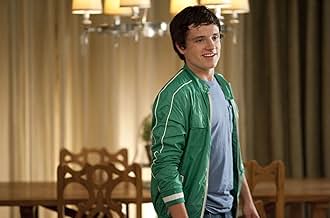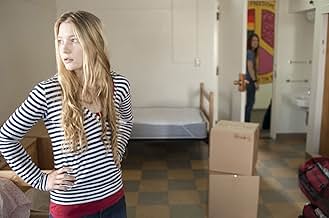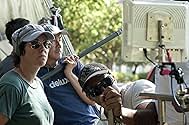IMDb RATING
7.0/10
136K
YOUR RATING
Two children conceived by artificial insemination bring their biological father into their non-traditional family life.Two children conceived by artificial insemination bring their biological father into their non-traditional family life.Two children conceived by artificial insemination bring their biological father into their non-traditional family life.
- Nominated for 4 Oscars
- 29 wins & 133 nominations total
Yaya DaCosta
- Tanya
- (as Yaya Dacosta)
Rebecca Lawrence Levy
- Brooke
- (as Rebecca Lawrence)
James MacDonald
- Clay's Dad
- (as James Macdonald)
Stuart Blumberg
- Sous-chef
- (uncredited)
Diego Calderón
- Waiter
- (uncredited)
- Director
- Writers
- All cast & crew
- Production, box office & more at IMDbPro
Storyline
Did you know
- TriviaMark Ruffalo filmed his role in only six days.
- GoofsLaser tells Paul that Joni got the National Merit Scholarship for science; however, National Merit Scholarships are not awarded in any specific categories. Candidates are chosen because of high scores on the PSAT, which does not include a science section.
- SoundtracksCousins
Written by Ezra Koenig, Rostam Batmanglij, Chris Baio, and Chris Tomson
Performed by Vampire Weekend
Courtesy of XL Recordings Ltd
By arrangement with The Beggars Group
Featured review
The Kids Are All Right is one of those sweetly sentimental comedies that manages to be funny as well. It's about a decidedly unorthodox family that's far from perfect – and what happens when a so-called interloper arrives on the scene. It's wonderfully acted, with affecting performances by Mark Ruffalo and Julianne Moore, and it's engaging entertainment, no small feat when the subject of touching charm arises.
Nic (Annette Bening) and Jules (Moore) are a married lesbian couple in California with two kids, Laser (Josh Hutcherson) and Joni (Mia Washikowska). Two two kids – one for each mom – are the result of a sperm donor, and when Joni turns 18 she places a call to the sperm bank at her brother's behest. The two wind up meeting Paul (Ruffalo) and hit it off, but when the two moms meet him, they have strikingly different reactions to his arrival.
There's excellent conflict afoot here. The kids resent their moms for being so defensive about their wanting to know about their own biological father; the moms resent the kids for looking into the matter themselves. X is the calm, mediating type; she's outwardly caring and splits her time between raising the two kids and starting new (doomed) businesses. By contrast, Nic is more inwardly insecure, and she compensates by controlling as much as possible of the lives of the other three. No wonder Paul's appearance causes Nic to get her back up.
The movie isn't one of those where increasingly wacky situations occur. It's not a slammed-door comedy. People behave as if you'd expect them to behave, which is nice thing to see in a comedy (rather than exaggeration of gestures and speech, for example). Eventually, it isn't enough that Paul shows up in everyone's lives, disrupting what little harmony they have; something else happens as a result of his appearance that really behaves as the key conflict. And for once, when the culprits are confronted, there is no neatly tied response given by the rest of the family.
Another pleasant aspect of the movie is that it never treats the relationship between Bening and Moore as if it were anything but the most commonplace thing on earth. It's not just that these two woman are married and in love, it's that they're also utterly human – they fight each other convincingly, they get their feelings hurt, and they reconcile with the kind of subtlety you rarely really see in movies these days. Each character, rather than being simply caricatures of what a straight person would assume a gay married couple would look like, has her own striking personality, and the two actresses perform quite well. I think Moore comes off a little better and that Bening's character sometimes seemed a little one dimensional – but this is more likely an oversight on the part of the writer, not the actress. Ironically, it was Bening who received an Oscar nomination for this movie, but I think Moore's work was superior here.
Overall, the script neither flashy nor contrived; situations don't crop up just so we can have a laugh at someone's expense. Well done.
The Kids Are All Right is a genuinely funny movie. It's not a gagfest, and it wasn't meant to be one. The characters are sincere but not always forthright; they all seem to make a bad decision or two in the movie. The cast was well selected (lest I forget, Ruffalo is aces as a laid-back buttinsky, if such a thing can exist), and it's a movie worth seeing.
Nic (Annette Bening) and Jules (Moore) are a married lesbian couple in California with two kids, Laser (Josh Hutcherson) and Joni (Mia Washikowska). Two two kids – one for each mom – are the result of a sperm donor, and when Joni turns 18 she places a call to the sperm bank at her brother's behest. The two wind up meeting Paul (Ruffalo) and hit it off, but when the two moms meet him, they have strikingly different reactions to his arrival.
There's excellent conflict afoot here. The kids resent their moms for being so defensive about their wanting to know about their own biological father; the moms resent the kids for looking into the matter themselves. X is the calm, mediating type; she's outwardly caring and splits her time between raising the two kids and starting new (doomed) businesses. By contrast, Nic is more inwardly insecure, and she compensates by controlling as much as possible of the lives of the other three. No wonder Paul's appearance causes Nic to get her back up.
The movie isn't one of those where increasingly wacky situations occur. It's not a slammed-door comedy. People behave as if you'd expect them to behave, which is nice thing to see in a comedy (rather than exaggeration of gestures and speech, for example). Eventually, it isn't enough that Paul shows up in everyone's lives, disrupting what little harmony they have; something else happens as a result of his appearance that really behaves as the key conflict. And for once, when the culprits are confronted, there is no neatly tied response given by the rest of the family.
Another pleasant aspect of the movie is that it never treats the relationship between Bening and Moore as if it were anything but the most commonplace thing on earth. It's not just that these two woman are married and in love, it's that they're also utterly human – they fight each other convincingly, they get their feelings hurt, and they reconcile with the kind of subtlety you rarely really see in movies these days. Each character, rather than being simply caricatures of what a straight person would assume a gay married couple would look like, has her own striking personality, and the two actresses perform quite well. I think Moore comes off a little better and that Bening's character sometimes seemed a little one dimensional – but this is more likely an oversight on the part of the writer, not the actress. Ironically, it was Bening who received an Oscar nomination for this movie, but I think Moore's work was superior here.
Overall, the script neither flashy nor contrived; situations don't crop up just so we can have a laugh at someone's expense. Well done.
The Kids Are All Right is a genuinely funny movie. It's not a gagfest, and it wasn't meant to be one. The characters are sincere but not always forthright; they all seem to make a bad decision or two in the movie. The cast was well selected (lest I forget, Ruffalo is aces as a laid-back buttinsky, if such a thing can exist), and it's a movie worth seeing.
- dfranzen70
- Jan 27, 2011
- Permalink
Details
- Release date
- Countries of origin
- Official site
- Language
- Also known as
- Lũ Trẻ Đều Ổn
- Filming locations
- Production companies
- See more company credits at IMDbPro
Box office
- Budget
- $4,000,000 (estimated)
- Gross US & Canada
- $20,811,365
- Opening weekend US & Canada
- $491,971
- Jul 11, 2010
- Gross worldwide
- $34,758,951
- Runtime1 hour 46 minutes
- Color
- Sound mix
- Aspect ratio
- 1.85 : 1
Contribute to this page
Suggest an edit or add missing content











































